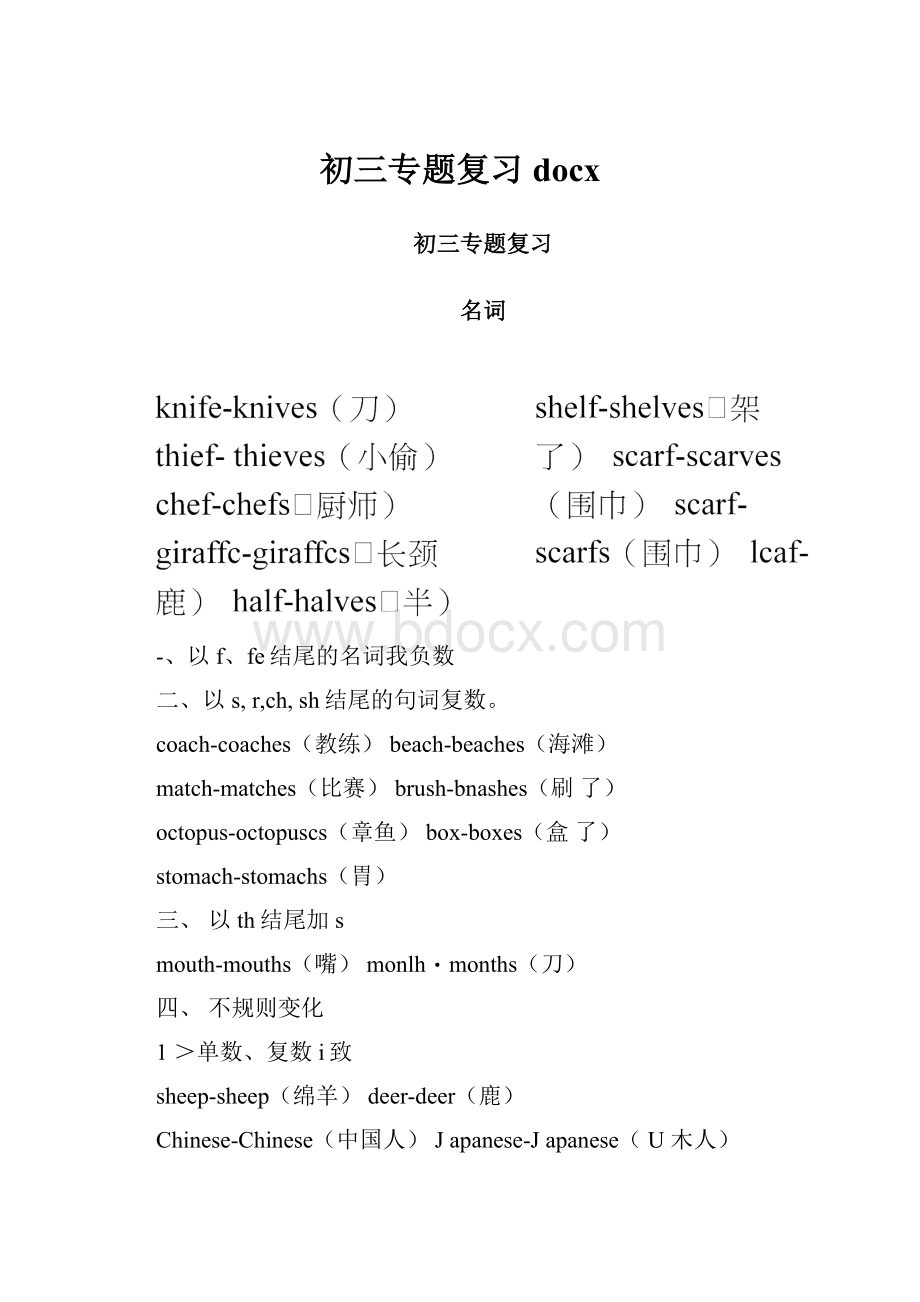初三专题复习docx.docx
《初三专题复习docx.docx》由会员分享,可在线阅读,更多相关《初三专题复习docx.docx(41页珍藏版)》请在冰豆网上搜索。

初三专题复习docx
初三专题复习
名词
-、以f、fe结尾的名词我负数
二、以s,r,ch,sh结尾的句词复数。
coach-coaches(教练)beach-beaches(海滩)
match-matches(比赛)brush-bnashes(刷了)
octopus-octopuscs(章鱼)box-boxes(盒了)
stomach-stomachs(胃)
三、以th结尾加s
mouth-mouths(嘴)monlh・months(刀)
四、不规则变化
1>单数、复数i致
sheep-sheep(绵羊)deer-deer(鹿)
Chinese-Chinese(中国人)Japanese-Japanese(U木人)
means・means(方法)
2、下列名词只有复数
pcoplc(人们)glasscs(眼镜)pants(氏裤)trouscrs(裤了)
shorts(M/"裤)clothes(衣服)scissors(剪刀)jeans(牛仔裤)
注:
上述名词做主语时,谓语动词用复数,但和表示“一”的量词连用时,用单数"apairof—条/
双/
eg:
1.Mypantsareverylong.
2.Thereisapairofglassesonthebed.
3、含有man的名词的复数:
man-*men但German除外。
Businessman-Businessmen(Hr|人)
Fisherman・Fishermen(渔人)
Englishman・Englishmcn(英国男人)
policewoman-policewomen(女警察)
postman-postmen(邮递员)
German-Germans(徳国人)
4、特殊变化
Child-children(小孩)foot-feet(脚)tooth-teeth(牙齿)
goose-geese(}l^)mouse-mice(老鼠)
五、集体名词主语吋,谓语用复数
1、people(人们)police(警察)staff(职员)class(同学们)family(家人、家庭成员)the+姓的复数,表示夫妇或一定,the+姓+family:
表示"一家人”有若丁成员组成。
注:
1、class表示“班、班级”有单数复数之分。
Eg.Thereare30classesinourschool,class表示"课”相当于lesson.复数classes
Eg.Wehaveeightclasseseveryday.
2>family做家庭讲时,有单数之分。
Eg.Therearetwentyfamiliesinthesmallvillage.(有20户人家)
Eg.1.1hearthepolicehavealreadycaughtthetwothieves.
2.ClassFivearehavingP.Eclass.
3.LiPing'sfamilyarewatchingTV
4.TheKingfamilyoftengoforawalkaftersuppe匚
六、不可数名词:
1.定义:
2.特证:
无复数形式,川作主语时,看作一•个三单形式的主语,川代词指代时用“it”
Eg.Aswaterisveryimportanttous,weshouldtryourbestourbesttoprotectit.
Moneydoesn'tmeaneverything.
注:
如果用and连接两个不可数名词做主语,胃语用复数。
Eg.Timeandmoneyarebothimportant.
3.不可数名词量的表示:
1.用“数词+量词+of”表示
以上下是常见的量词词组:
abowlof一碗
twobowlsof两碗
abottleof一瓶
asliceof一片主要用于修饰不可数名词
apieceof一,块/片,条
acupof—茶杯
aglassof一玻璃杯
akiloof一公斤
halfakilo半公斤
twoandahalfkilosof两公斤半既可修饰可数也可修饰不可数名词
twokilosandahalfof两公斤半
fiveboxesof五箱
tenbagsof十包/袋
2.也可用下面的形容词或短语表示概数
alittle,abitof.Some,much,alotof,quitealotof,plentyof,其中some,alotof,quitealotof,plentyof:
也可修饰可数名词。
注:
1.ThepopulationofChinaisthebiggestintheworld.
2.ThepriceofthepantsistoohighIdon'thavesomuchmoney.
3.1havelistenedtotheseveralpiecesofmusic.
七、名词所有格:
八、名词与其它类的转化:
(一)表示天气方面的名词、部分具它名词,在词尾加“y”以e结尾去e加y,重读闭音节结尾双写
辅音字母加y变为形容词。
rain一rainy(下雨)cloud一cloudy(阴天的)sun—sunny(天晴的)fun—funny(滑稽的)health—healthy(健康的)noise—noisy(吵闹的)salt一salty(咸的)taste一tasty(美味的)
(游客很多的)
wind一windy(刮风的)
snow一snowy(下雪的)
mist—misty(多雾的)
luck一lucky(幸运的)sleep一sleepy(因的)shine—shiny(有)silk一silky(光泽的)tourist一touristy(游客很多的)
注:
sleep(睡觉)-asleep(睡觉的)wake(睡醒)-awake(睡醒的)lucky-unlucky(不幸的)-luckily(幸运的)
(-)有些名词后加ful变为形容词care(关心)-careful(仔细的)success-successful(成功的)thank-thankful(感激的)color-colorful(鲜艳的)play-playful(有玩耍的)pain(疼)-painful(疼的)
(这样的形容再加y变为副词)use-useful(冇用的)help-helpful(有帮助的)wonder-wonderful(美妙的)peace-peaceful(和平和)forget-forgetful(健忘的)
(三)有些名词后加al,以e结尾去e加al变为形容词。
internet(因特网)-international(国际的)tradition(传统)-traditional(传统的)center(中央)-central(中心的)profession(职业)-professional(职业的)music(音乐)-musical(音乐的)
(四)表示方位的名词后加ern变为形容词
east(东)-eastern(东边的)west(西)
person(人)・personal(个人的)education-educational(有教育有意义的)nature(自然)-natural(自然的)medicine(药)-medical(医疗的)nation(国家、民族)-national(国家的、民族的)
-western(西边的)
south(南)-soulhcm(南边的)north(北)-northern(北边的)
(五)冇些名词后加able,ous,ic,on,ly等可转化为形容词。
enjoy-enjoyable(愉快的、有趣的)danger(危险)-dangerous(危险的)suit-suitable(适合的)energy(能量)-energetic(精力充沛的)history-historic(冇历史意义的)wool(羊毛)-woolen(羊毛的)
lively(活泼的)living(活的)做定语,表语alive(活的)做表语
knowledge(知识)-knowledgeable(知识深渊的)mystery(神秘的事)-mysterious(神秘的)athlete(运动员)-athletic(强壮的)science(科学)-scientific(科学的)wood-wooden(木头的)
live
friend-friendly(友好的)-unfriendly(不友好的)day-daily(日常的,每日的)loverlovely(可爱的)
[Joving(慈祥的)
comfort-comfortable(舒服的)pride-proud(自豪的)
hunger(饥饿)-hungry(饥饿的)
(六)部分名词后加cd或ing变为形容词
talent-talented(有天赋的)balance-balanced(平衡的)
experience(经验)-experienced(有经验的)
(七)一些名词加上后缀或改变词尾,转化为别的名词
village(村了)-villager(村尾)program-programmer(程序师)
friend-friendship(友谊)
important-importance(重要性)confident-difference(口信心)
different-difference(不同点)
confident-confidence
safe(安全的)-safety(安全)new-news(新闻)
difficult-difficulty(难点)true-truth(真相,事实)
(八)名词和形容词之间的丸相转化
dead(死的「death(死)beauty(美貌)-beautiful()
high(鬲的)-height(身高)happy-happiness(幸福)busy-business(生意)-businessman(商人)ill-illness(疾病)home-homeless(无家可归的)
care-careless(粗心的)hope-hopeless(无希望的)use・useless(无用的)
(九)国名与某国的、某国人,语言之间的转化
国名
某国的/某国人
语言
China
Chinese
Chinese
Japan
Japanese
Japanese
England
English/Englishman
English
America
American
English
Australia
Australian(襖大利亚的)
English
Canada
Canadian(加拿大的)
English
India
Indian(印度的)
English
Italy
Italian(意大利的)
Italian(意大利语)
Brazi1
Brazilian(巴西的)
France
Frenchman(法国人)
French(法语)
Germany
German(德国人)
German(徳语)
Europe(欧洲)
European(欧洲的)
Asia(亚洲)
Asian(亚洲人)
数词
一.基数词
one
eleven
two
twelve
twenty
twenty-one
three
thirteen
thirty
four
fourteen
forty
five
fifteen
fifty
six
sixteen
sixty
seven
seventeen
seventy
eight
eighteen
eighty
nine
nineteen
ninety
ten
hundred
二、规律:
13-19由个位数+teen构成,fl
thirteen(13)fifteen(15)eighteen(18)
20-90由个位数+ty构成但
twenty(20)thirty(30)forty(60)fifty(50)eighty(80)特殊记
三、序数词与基数词转化的口诀
1、2、3特殊记
one-firsttwo-secondthree-third
其余th加后面、加后面有特殊
8去t,9去e,ve要用f替,ty变为tie
eight-eighthnine-ninth
five-fifthtwelve-twelfth
twenty-twentiethfifty-fiftieth遇到儿I•儿,变下个位就可以
twenty-five-twenty-fifth
ninety-nine—ninety-ninth
四、分数表达法:
分了(基数词)/分母(序数词),如果分了人于/分母用序数词
eg:
—:
onefourth=aquarter〜4
扌:
threefourths=threequarters
—:
fivesixths
6
2
—:
twofifths
5
五、
eg:
数词的形容词式表达:
(数词和名词间加“一”名词用单数)
1)aneight一year—oldboy(—个八岁的男孩)=aboyofeightyearsold
2)ten一minutewalk=tcnminutes'walk
六、关于“半”和“几个半”的表达
eg:
1)halfanhour(半小时)halfayear(半年)
halfanmonth(半个月)halfakilo(半公斤)
2)twoandahalfyears(两年斗勺二twoyearsandahalf.
3)oneandahalfyears(—年半)
oneyearandahalf
七、hundredthousandmillion
1)表示概数在词尾加s后接of
“加s,接of”
2)表示确定的数冃,前而有具体数词,有单数
“不加S,不接of”
注:
①如果前面over(超过),morethan(多于)后面紧跟数字
eg:
1)morethan/overthreethousand(3千多)
②前面冇manyafewseveral表示一个确定的数冃
eg:
manyhundredspeople
八、what'sthedatetoday?
几月几号
whatdayisittoday星期儿
what'stoday?
什么是日期
what'sthetime?
儿点钟
whattimeisit?
MondaySaturday
TuesdaySunday
Wednesday
Thursday
Friday
九、次数oneoncetwotwice
代词
一、反身代词
1、定义:
是用来表示某人口己的一类代词
2、用法:
1)句子的宾语就是主语H己(指同一者),宾语用与主语一致的反身代词
eg:
①Weshouldleamtolookafterourselves.
②Thegirlhurtherselfwhenshefelloffthebike.
2)作主语或宾语的同位语,表示亲自、白己
eg:
①Mymotherherselfcleanedmyroom.
②Wcwanttoseeourteacherhimselfmakeatalentshowforus.
3)常与by搭配,构成介词短语,表示独口
eg:
①Icanworkouttheproblembymyself.
②Thegirlsavedthetwoboysoutofthelakebyherself/allbyherself(全靠她自己)
4)含反身代词的习惯短语
enjoyoncsclf=havcagoodtime玩得高兴
helponeselfto请H己吃
teachoneself=learn+学科+byoneself处大小写
leavebyoneself把某人单独留下
allbyoneself:
(某人自己,全靠某人自己)
反身供词的记忆:
1.单数以self结尾,复数把f变为ves(selves)
2.第一,二从称,物主代词+self/selves.
第三人称:
宾格+self/selves
二、不定代词
1.不定代词用来指代不确定的人或事物
2•不定彳弋词主要有:
littlefew.Someanymuchbothalleitherneitherotheranothereacheveryonenone(没i人称)
3.不定代词的用法:
1)one:
作不定代词时,既口J指人,也可指物,它可以代替上文中的单数名词,代替复数名词用onesoneof••宀••中的一个,谓语用单数,
Eg:
Ilikeanapple,wouldyoulikeone?
2)whichbooksareyours?
Theonesonthefloor.
3)1havewatchedtheTVprogram,let'swatchanotherone.
(2)one和it的区别
One:
川來代替同一名称的另一件东西,it代替同一名称的同一件东西,且是单数或不可数名词,eg^here^ssomemilkhere,wouldyouliketodrinkit?
(3)nonc:
只作名词,“没冇任何人和物”既可指人,也可指物,none后常跟of短语,
eg:
®—WhohasbeentoAmerica?
—None,(—个也没去过)
©Noneofthemisadoctor.
®一Isthereanythinginthebox?
—None(什么也没有)
(4)none和noone的区别:
Noone表示一个也没有,只指人,
eg:
①Nooneplaysbasketballonweekdays・
(5)both:
M者都,谓语用复数,位于助动词,be动词之后,实义动词前。
cg:
l)wcbothlikeplayingbasketball
2)Theyarebothdoctorsbothof(两个)…都
eg:
l)Bothofthemareright.
Both…and…,…和…都,强调两者都,连接两个代词,名词做主语,谓语用复数,
eg:
l)BothBeijingandShanghaiareverybeautifulcities
2)BothyouandhelikewatchingTV.
6.either:
W者中的一个,谓语用单数。
eg:
l)—wouldyouliketeaorcoffee?
—Eitherisok(随便哪样都行)eitherof…(两者)…中的一个
Eg:
1)1hopeeitherofthemteachesusEnglish
2)eitherofyoucangoshoppingwithmeeithei•…oi•…:
要么…要么…不是…就是…连接两者作主语时,谓语动词的单,复数収决于靠它最近的主语。
eg:
l)Eitheryouoryoursisterdoesthechores.
7.neither:
两者都不,谓语用单数。
(注:
三者以上都不用none)
eg:
l)-whichsportsdoyoulike,swimmingorskating
-neither(都不喜欢)
Neitherof(两者)…都不,谓语用单数
eg:
1)Neitherofuslikesfruit・
Neithernor,既不,也不
连接两者作主语时,谓语的单、复数収决于最临近的一个
eg:
1)NeitherZhangHuanoryouaregoingswimming・
2)Theweatherisneithercoldnorhotinautumn
3)Thecoatsintheshopareeithertoolongortooshort,theydonIfitme.
补充:
notonlybut,also;不仅而且
连接两个主语时,谓语的单复数取决于临近的那个
eg:
l)Not,onlyyoubutalsoheismyfriend・
Bothyouandhearemygoodfriends・
2)1likenotonlyChinesebutalsoEnglish
IlikebothChineseandEnglish
复合不定代词
人
物
somebody/someone(某人)
something(某事)
anybody/anyone(任何人)
anything(任何事)
nobody/noone(没人)
nothing(没事)
none(没人,没物)
everybody/everyone(每人)
everything(每件事)
地点:
somewhere某地anywhere任何一处everywhere到处hereandthere
用法:
1、一般用作名词,在词中作主语或宾语用作主语时川谓语单数。
eg:
1)Everythingbeginstogrowinspring
2)Listen,somebodyistalkingintheroom.
2、当句小的主语是指人的复合不定代词,反意疑问句的主语一般用they或he,但如果是指物的,反意疑问句的主语用it.
eg:
I)Somebodyknockedatthedoor,didn'tthey?
2)EveryonehaspassedthePEtestinourclass,hasn^the/haven9t